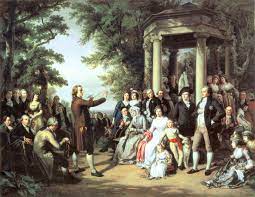By: Maddox Brown
Salutations,
When you initially think of the concept of the Enlightenment, what probably first comes to mind is what you were taught during your history classes. A philosophical movement that made its merry way through the lands of Europe during the 18th century. Its central premise was the values of reason, individuality, and skepticism. They also advocated for liberty and the equality of all people. With these pillars of the Enlightenment stated, it is not difficult to find out how it is still relevant in our society today. However, many people still gloss over it, and I don’t blame them. With the need to understand it not being pronounced, who needs to know? Anyways, no matter what side you are in, I shall tell you how the Enlightenment is still significant in forming today.
 One of the many ways the will of the Enlightenment is still with us to this day takes the form of our American government. If you recall, Baron De Montesquieu, one of the Enlightenment philosophers, you’ll remember his political views of government. He believes that government should be best separated into three parts, the legislative, the judicial, and the executive branches. The legislative is the parliament or congress, the judicial being of the Supreme Court, and the executive is the President. One keeps the other in check to ensure balance and prevent any branch from becoming too powerful. We see that insight into our American government and its statement of the three branches, which still hold to Montesquieu’s belief to this day.
One of the many ways the will of the Enlightenment is still with us to this day takes the form of our American government. If you recall, Baron De Montesquieu, one of the Enlightenment philosophers, you’ll remember his political views of government. He believes that government should be best separated into three parts, the legislative, the judicial, and the executive branches. The legislative is the parliament or congress, the judicial being of the Supreme Court, and the executive is the President. One keeps the other in check to ensure balance and prevent any branch from becoming too powerful. We see that insight into our American government and its statement of the three branches, which still hold to Montesquieu’s belief to this day.
The Enlightenment also had its fair share of contributions to the Bill of Rights, as well as, the Declaration of Independence. In the Declaration of Independence, Thomas Jefferson demanded the rights of life, liberty, and happiness for the men of America, which parallels with the Enlightenment Philosopher- John Locke’s ideology of life, liberty, and the pursuit of land, the three Ls. Over time, this call for liberty and equality has spread its recipients to not only the white men of America but everyone, not accounting for their race or gender.
Lastly, the Enlightenment played a major part in the formation of democracy and its ideologies. The statement that rulers did not get their power and authority from God, but from the people, meaning that people had the right to oppose and refuse their leader if their collective requirements were not met. They could replace that leader with one that respects their rights. We still have this way of thinking today, in one way, in the form of voting, for a new president, new senators, and new representatives of the House. Granted, we have electoral colleges that may cause some people to differ in their opinion of if the Enlightenment statement still holds up today; however, we still have the option of using our voice in matters concerning government.
Now that you have new-found knowledge, or have remembered, how the Enlightenment still affects us today, I hope you can come out of this with a new set of eyes, figuratively. A new perspective on how this society is handled and maintained. Maybe you could even teach someone else about this and spread the knowledge of the Enlightenment.
References:
> https://edtechbooks.org/democracy/enlightenment
> https://www.historyhit.com/enlightenment-ideas-that-changed-the-world/

